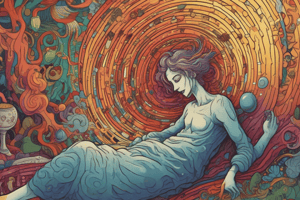Podcast
Questions and Answers
What is the approximate percentage of the world population affected by schizophrenia?
What is the approximate percentage of the world population affected by schizophrenia?
- 0.5%
- 1.5% (correct)
- 2.5%
- 3.5%
What is the age range when symptoms of schizophrenia typically first appear?
What is the age range when symptoms of schizophrenia typically first appear?
- 25-45 years old
- 15-35 years old (correct)
- 10-20 years old
- 20-40 years old
What is the main neurotransmitter involved in the control of behavior and emotions in the limbic system?
What is the main neurotransmitter involved in the control of behavior and emotions in the limbic system?
- Dopamine (correct)
- Serotonin
- Norepinephrine
- GABA
What type of symptoms are delusions, behavior disturbance, and hallucinations?
What type of symptoms are delusions, behavior disturbance, and hallucinations?
What is the term for a fixed false belief?
What is the term for a fixed false belief?
What is the term for a lack of motivation and interest in activities?
What is the term for a lack of motivation and interest in activities?
How many types of schizophrenia are mentioned in the text?
How many types of schizophrenia are mentioned in the text?
What is the name of the theory that explains the biochemical cause of schizophrenia?
What is the name of the theory that explains the biochemical cause of schizophrenia?
What is the primary cause of schizophrenia according to the atypical theory of psychosis?
What is the primary cause of schizophrenia according to the atypical theory of psychosis?
What is the main target of traditional antipsychotic drugs?
What is the main target of traditional antipsychotic drugs?
What is the effect of histamine-1 receptor antagonism by phenothiazines?
What is the effect of histamine-1 receptor antagonism by phenothiazines?
What is the result of blocking all pathways of dopamine in the brain?
What is the result of blocking all pathways of dopamine in the brain?
What type of receptor antagonism can cause urinary retention?
What type of receptor antagonism can cause urinary retention?
What is the structure of phenothiazine?
What is the structure of phenothiazine?
What is the typical configuration of a thioxanthene for optimal receptor affinity?
What is the typical configuration of a thioxanthene for optimal receptor affinity?
What is the essential feature of a fluorobutyrophenone for activity?
What is the essential feature of a fluorobutyrophenone for activity?
What is the primary mechanism of action of First-generation antipsychotics?
What is the primary mechanism of action of First-generation antipsychotics?
What is the potency of chlorpromazine as a First-generation antipsychotic?
What is the potency of chlorpromazine as a First-generation antipsychotic?
What is the characteristic of Atypical antipsychotics that distinguishes them from conventional antipsychotics?
What is the characteristic of Atypical antipsychotics that distinguishes them from conventional antipsychotics?
What is the advantage of Atypical antipsychotics over conventional antipsychotics?
What is the advantage of Atypical antipsychotics over conventional antipsychotics?
What is the FDA approval year of Clozapine (Clozaril®)?
What is the FDA approval year of Clozapine (Clozaril®)?
What is the available form of Olanzapine (Zyprexa®)?
What is the available form of Olanzapine (Zyprexa®)?
Flashcards are hidden until you start studying
Study Notes
Psychosis and Schizophrenia
- Psychosis is a condition in which a person isn't in contact with reality, affecting thinking, emotions, and behaviors.
- Schizophrenia is a chronic mental illness affecting 1.5% of the world population, with symptoms appearing between 15-35 years old.
Symptoms of Schizophrenia
- Positive symptoms:
- Delusions (a fixed false belief)
- Behavior disturbance (Thought disorder + Disorganized speech)
- Hallucinations (hearing imaginary voices)
- Negative symptoms:
- Loss of motivation and interest
- Impaired emotional responses
- Social withdrawal
Types of Schizophrenia
- Paranoid
- Disorganized
- Catatonic
- Residual
Biochemical Causes of Schizophrenia
- Dopamine Hypothesis of Schizophrenia: increased dopaminergic neurotransmission in the limbic system
- Atypical theory of psychosis: imbalance of Dopamine & Serotonin in the brain
Typical (Traditional) Antipsychotics
- Dopamine receptor antagonists with higher affinity for D2 over D1 receptors
- Affect positive symptoms
- Side effects:
- Extrapyramidal side effects (EPS) & increased prolactin due to blocking all pathways of dopamine in the brain
- Antihistaminic effects leading to sedation
- Serotonergic receptor antagonism leading to weight gain
- Muscarinic receptor antagonism leading to urinary retention, dry mouth, blurred vision, constipation, sinus tachycardia, cognition, and memory effects
- Alpha-1-receptor antagonism leading to orthostatic hypotension and reflex tachycardia
Atypical (New) Antipsychotics
- Block 5-HT2 receptors in the brain, in addition to dopamine receptors
- Exert an effect upon both positive and negative symptoms
- Fewer side effects than traditional antipsychotics
- No risk of extrapyramidal effects
- Examples: Clozapine (Clozaril), Olanzapine (Zyprexa)
Studying That Suits You
Use AI to generate personalized quizzes and flashcards to suit your learning preferences.



